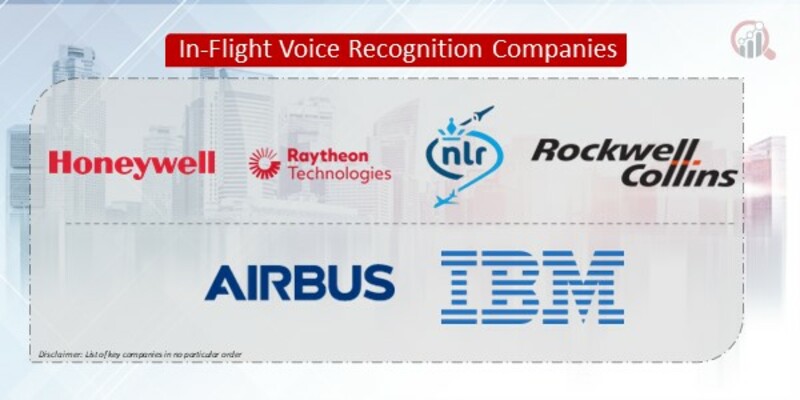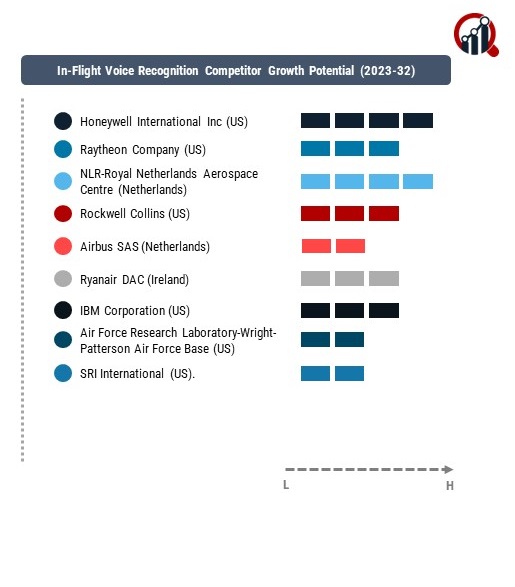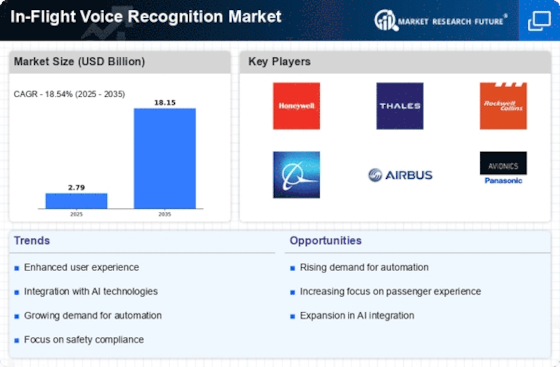Top Industry Leaders in the In Flight Voice Recognition Market

Strategies Adopted: Key players in the In-Flight Voice Recognition Market deploy various strategies to maintain their competitive edge and capitalize on market opportunities. These strategies include:
Technological Innovation: Companies invest in research and development to develop advanced voice recognition algorithms, natural language processing capabilities, and integration with cabin management systems to enhance the accuracy, reliability, and user experience of in-flight voice recognition systems.
Collaboration and Partnerships: Collaborations with aircraft manufacturers, airlines, technology partners, and industry associations help companies access new markets, validate technology solutions, and address regulatory and certification requirements for in-flight voice recognition systems.
Customization and Integration: Companies offer customizable and integrated voice recognition solutions that can be tailored to the specific requirements of different aircraft types, cabin configurations, and customer preferences, providing flexibility, interoperability, and value-added services to airlines and passengers.
User-Centric Design: Companies prioritize user-centric design principles, usability testing, and passenger feedback to develop intuitive and user-friendly interfaces, voice commands, and features that enhance the overall in-flight experience and drive adoption of voice recognition technology.
Key Companies in the In-Flight Voice Recognition market include
Honeywell International Inc (US)
Raytheon Company (US)
NLR-Royal Netherlands Aerospace Centre (Netherlands)
Rockwell Collins (US)
Airbus SAS (Netherlands)
Ryanair DAC (Ireland)
IBM Corporation (US)
Air Force Research Laboratory-Wright-Patterson Air Force Base (US)
SRI International (US).
Factors for Market Share Analysis: Several factors contribute to the analysis of market share in the In-Flight Voice Recognition Market, including:
Performance and Accuracy: The performance, accuracy, and reliability of voice recognition systems play a critical role in determining market share, with companies offering high-quality, real-time voice recognition solutions capable of understanding diverse accents, languages, and commands gaining a competitive advantage.
Integration and Compatibility: Seamless integration with existing avionics, cabin management systems, and in-flight entertainment systems is essential for gaining market share and winning contracts, as airlines seek interoperable solutions that enhance operational efficiency and passenger satisfaction.
Regulatory Compliance: Compliance with aviation regulations, safety standards, and certification requirements, such as DO-178C for software development and DO-160 for environmental testing, is crucial for gaining market share and building trust among airlines, regulators, and passengers.
Data Privacy and Security: Protection of passenger data, voice recordings, and communication channels is paramount for gaining market share and maintaining customer trust, with companies implementing robust encryption, authentication, and privacy controls to safeguard sensitive information and prevent unauthorized access or misuse.
New and Emerging Companies: In addition to established players, new and emerging companies are entering the In-Flight Voice Recognition Market, bringing innovative technologies and solutions. These companies often focus on niche segments or disruptive approaches, challenging traditional players and driving innovation in the industry. Some notable new and emerging companies in the market include:
VoiceFlight Systems LLC
VocalZoom Ltd.
DeepAero AI
Airspeq
VoiceFly
Voci Technologies Inc.
Speak With Me, Inc.
Cortical.io
VoiceFlight Systems LLC
AviaTech Systems
Industry News and Current Investment Trends: Recent developments and investment trends in the In-Flight Voice Recognition Market reflect a growing interest in voice-enabled cabin features, digital transformation, and passenger experience enhancements. Key highlights include:
Expansion of Voice Services: Airlines are expanding voice-enabled services beyond basic commands, such as cabin lighting, temperature control, and entertainment selection, to include personalized recommendations, concierge services, and natural language interactions, enhancing the overall passenger experience.
Integration with Digital Ecosystems: Voice recognition systems are being integrated with digital ecosystems, including mobile apps, virtual assistants, and IoT devices, to provide seamless connectivity, continuity of services, and personalized experiences across pre-flight, in-flight, and post-flight touchpoints.
Investment in AI and Machine Learning: Companies are investing in artificial intelligence (AI) and machine learning (ML) algorithms to improve voice recognition accuracy, context awareness, and conversational capabilities, enabling more natural and intuitive interactions between passengers and in-flight systems.
Regulatory Approvals and Certifications: Voice recognition solutions are undergoing regulatory approvals and certifications, such as FAA certification for avionics systems and GDPR compliance for data privacy, to ensure safety, security, and legal compliance in commercial aviation operations.
Overall Competitive Scenario: The In-Flight Voice Recognition Market is highly competitive, driven by technological innovation, regulatory compliance, and user experience enhancements. Established players leverage their expertise, market presence, and industry partnerships to maintain market leadership, while new entrants disrupt the market with novel technologies and agile strategies. As the demand for voice-enabled cabin features continues to grow, companies that focus on performance, integration, privacy, and passenger-centric design will thrive in the competitive landscape of the In-Flight Voice Recognition Market.
In-Flight Voice Recognition Industry Developments
For Instance, April 2022
In order to quickly transform the current conversation data into automated self-service experiences, Verint created Verint Virtual Assistant (IVA), a low-code conversational AI product. To divert calls and assist clients, it enables business professionals to swiftly create a production-ready chatbot. With limitless intelligence for both speech and digital, Verint IVA enables enterprises to enhance capabilities across the workplace.
For Instance, September 2021
In order to integrate Nuance Dragon Ambient eXperience (DAX), an ambient clinical intelligence (ACI) technology, with Microsoft Teams and scale virtual consultations focused on improving physician wellbeing and patient health outcomes, Microsoft and Nuance Communications introduced Nuance Dragon Ambient eXperience (DAX).












